Related Research Articles
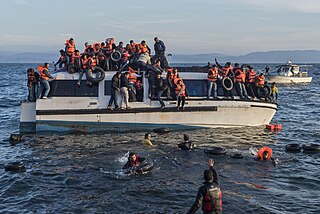
Forced displacement is an involuntary or coerced movement of a person or people away from their home or home region. The UNHCR defines 'forced displacement' as follows: displaced "as a result of persecution, conflict, generalized violence or human rights violations".
Since 1945, immigration to the United Kingdom, controlled by British immigration law and to an extent by British nationality law, has been significant, in particular from the Republic of Ireland and from the former British Empire, especially India, Bangladesh, Pakistan, the Caribbean, South Africa, Nigeria, Ghana, Kenya, and Hong Kong. Since the accession of the UK to the European Communities in the 1970s and the creation of the EU in the early 1990s, immigrants relocated from member states of the European Union, exercising one of the European Union's Four Freedoms. In 2021, since Brexit came into effect, previous EU citizenship's right to newly move to and reside in the UK on a permanent basis does not apply anymore. A smaller number have come as asylum seekers seeking protection as refugees under the United Nations 1951 Refugee Convention.

The Dublin Regulation is a European Union (EU) law that determines which EU Member State is responsible for the examination of an application for asylum, submitted by persons seeking international protection under the Geneva Convention and the EU Qualification Directive, within the European Union. It is the cornerstone of the Dublin System, which consists of the Dublin Regulation and the EURODAC Regulation, which establishes a Europe-wide fingerprinting database for unauthorised entrants to the EU. The Dublin Regulation aims to "determine rapidly the Member State responsible [for an asylum claim]" and provides for the transfer of an asylum seeker to that Member State.

Immigration is the international movement of people to a destination country of which they are not natives or where they do not possess citizenship in order to settle as permanent residents or naturalized citizens. Commuters, tourists, and other short-term stays in a destination country do not fall under the definition of immigration or migration; seasonal labour immigration is sometimes included, however.

Illegal immigration is the migration of people into a country in violation of the immigration laws of that country or the continuous residence without the legal right to live in that country. Illegal immigration tends to be financially upward, from poorer to richer countries. Illegal residence in another country creates the risk of detention, deportation, and/or other sanctions.

Stephen Hale OBE is the Chief Architect of Climate Catalyst, a new organisation established in March 2021 to accelerate action on climate change through building diverse coalitions of businesses, investors, civil society groups and other champions of climate action to influence national governments.
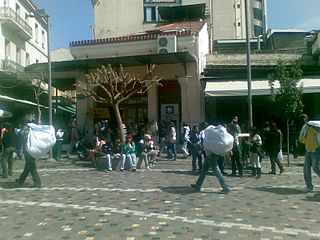
Immigration to Greece percentage of foreign populations in Greece is 7.1% in proportion to the total population of the country. Moreover, between 9 and 11% of the registered Greek labor force of 4.4 million are foreigners. Migrants additionally make up 25% of wage and salary earners.
The Gateway Protection Programme was a refugee resettlement scheme operated by the Government of the United Kingdom in partnership with the United Nations High Commissioner for Refugees (UNHCR) and co-funded by the European Union (EU), offering a legal route for a quota of UNHCR-identified refugees to be resettled in the UK. Following a proposal by the British Home Secretary, David Blunkett, in October 2001, the legal basis was established by the Nationality, Immigration and Asylum Act 2002 and the programme itself launched in March 2004. The programme enjoyed broad support from the UK's main political parties.
Refugees of the Syrian Civil War are citizens and permanent residents of Syria who have fled the country throughout the Syrian Civil War. The pre-war population of the Syrian Arab Republic was estimated at 22 million (2017), including permanent residents. Of that number, the United Nations (UN) identified 13.5 million (2016) as displaced persons, requiring humanitarian assistance. Of these, since the start of the Syrian Civil War in 2011 more than six million (2016) were internally displaced, and around five million (2016) had crossed into other countries, seeking asylum or placed in Syrian refugee camps worldwide. It is often described as one of the largest refugee crises in history.

During 2015, there was a period of significantly increased movement of refugees and migrants into Europe. 1.3 million people came to the continent to request asylum, the most in a single year since World War II. They were mostly Syrians, but also included significant numbers from Afghanistan, Nigeria, Pakistan, Iraq, Eritrea, and the Balkans. The increase in asylum seekers has been attributed to factors such as the escalation of various wars in the Middle East and ISIL's territorial and military dominance in the region, as well as Lebanon, Jordan, and Egypt ceasing to accept Syrian asylum seekers.

Migrant crisis is the intense difficulty, trouble, or danger situation in the receiving state due to the movements of large groups of immigrants escaping from the conditions which negatively affected their situation at the country of origin (departure). The "crisis" situation is not the refugee numbers but the system's failure to respond in an orderly way to the government's legal obligations. Some notable crises are; European migrant crisis, English Channel migrant crisis and World War II evacuation and expulsion.

Relations between the European Union (EU) and Turkey were established in 1959, and the institutional framework was formalised with the 1963 Ankara Agreement. Albeit not officially part of the European Union, Turkey is one of the EU's main partners and both are members of the European Union–Turkey Customs Union. Turkey borders two EU member states: Bulgaria and Greece.
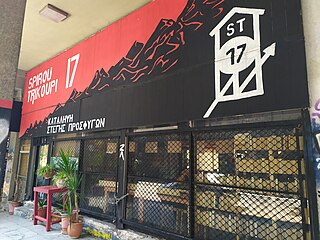
Athens refugee squats exist since the 2015 spike in the European migrant crisis. Greece has been a destination for migrants seeking refuge on the European continent via the "Balkan Route." Coalitions of solidarity groups and migrants have established squats throughout Athens to house refugees, demonstrating an alternative to solutions offered by the European Union and NGOs. The squats are grouped together in the Coordination of Refugee Squats. Notable projects included 5th School and City Plaza. In late 2019, the New Democracy party declared it would evict all the squats.
"Refugees as weapons", or "Weapon of Mass Migration" is a term used to describe a hostile government organizing, or threatening to organize, a sudden influx of refugees into another country or political entity with the intent of causing political disturbances in that entity. The responsible country usually seeks to extract concessions from the targeted country and achieve some political, military, and/or economic objective.
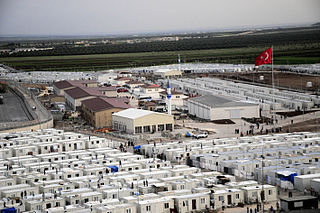
Turkey's migrant crisis, sometimes referred to as Turkey's refugee crisis, was a period during the 2010s characterised by a high number of people migrating to Turkey. Turkey received the highest number of registered refugees of any country or territory each year from 2014 to 2019, and had the world's largest refugee population according to the United Nations High Commissioner for Refugees (UNHCR). The majority were refugees of the Syrian Civil War, numbering 3.6 million as of June 2020. In 2018, the UNHCR reported that Turkey hosted 63.4% of all "registered Syrian refugees."
The migration and asylum policy of the European Union is within the area of freedom, security and justice, established to develop and harmonise principles and measures used by member countries of the European Union to regulate migration processes and to manage issues concerning asylum and refugee status in the European Union, in particular in the Schengen Area.
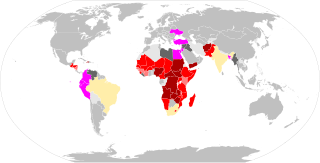
During the COVID-19 pandemic, food insecurity has intensified in many places – in the second quarter of 2020 there were multiple warnings of famine later in the year. In an early report, the Nongovernmental Organization (NGO) Oxfam-International talks about "economic devastation" while the lead-author of the UNU-WIDER report compared COVID-19 to a "poverty tsunami". Others talk about "complete destitution", "unprecedented crisis", "natural disaster", "threat of catastrophic global famine". The decision of WHO on March 11, 2020 to qualify COVID as a pandemic, that is "an epidemic occurring worldwide, or over a very wide area, crossing international boundaries and usually affecting a large number of people" also contributed to building this global-scale disaster narrative.

Climate migration is a subset of climate-related mobility that refers to primarily voluntary movement driven by the impact of sudden or gradual climate-exacerbated disasters, such as "abnormally heavy rainfalls, prolonged droughts, desertification, environmental degradation, or sea-level rise and cyclones". The majority of climate migrants move internally within their own countries, though a smaller number of climate-displaced people also move across national borders.
Pushback is a term that refers to "a set of state measures by which refugees and migrants are forced back over a border – generally immediately after they crossed it – without consideration of their individual circumstances and without any possibility to apply for asylum". Pushbacks violate the prohibition of collective expulsion of aliens in Protocol 4 of the European Convention on Human Rights and often violate the international law prohibition on non-refoulement.
Since at least 2008, Greece has pushed back tens of thousands of migrants, especially at the Evros border with Turkey and in the Aegean Sea. On land, the pushbacks involve taking people who have arrived at the Greek side of the border and transferring them to the Turkish side; most cases involve some form of abuse. Maritime pushbacks typically involve taking migrants who have either entered Greek territorial waters or landed on Greek islands and depositing them in Turkish territorial waters on craft without any means of propulsion. The number of pushbacks has increased following the European migrant crisis and breakdown in EU–Turkey relations in 2020. This incident occurred as a result of Turkey ceasing to prevent migrants from leaving for the European Union in February 2020, and in some instances actively encouraging them.
References
- ↑ "Greek Council for Refugees - Program support - Stavros Niarchos Foundation".
- ↑ McDonough, P.; Tsourdi, E. (2012). "The "Other" Greek Crisis: Asylum and Eu Solidarity". Refugee Survey Quarterly. 31 (4): 67–100. doi:10.1093/rsq/hds019.
- ↑ Sitaropoulos, Nicholas (2002). "Refugee welfare in Greece: towards a remodelling of the responsibility-shifting paradigm?". Critical Social Policy. 22 (3): 436–455. doi:10.1177/026101830202200304. S2CID 145337647.
- ↑ Voulgaridou, Maria G.; Papadopoulos, Renos K.; Tomaras, Vlassis (2006). "Working with refugee families in Greece: systemic considerations". Journal of Family Therapy. 28 (2): 200–220. doi: 10.1111/j.1467-6427.2006.00346.x .
- ↑ "Oxfam: Greece detains migrants, refugees without reason". InfoMigrants. ANSA. 19 November 2021. Retrieved 22 November 2021.